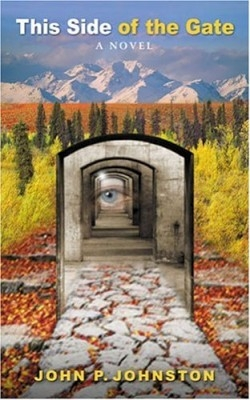This Side of the Gate
All stories take the reader on a journey and the best ones take us outside ourselves as well as provide insight on life hopefully for our betterment. Johnston ambitiously attempts to take his readers through many journeys providing a structure within which the reader can confront their expectations about life and spirit and open up to new possibilities and perspectives.
The novel traces one soul through numerous rebirths and karmic incarnations beginning with a boy who becomes a student to a spiritual master. Each chapter follows a formula whereby Johnston offers some outlook on history spirituality and/or psychology then dives into the middle of the latest life. Once the life ends and the soul reaches what the book terms “the other side of the gate” the soul is flung into yet another life determined by the actions and earthly deeds of the past existence.
The structure is purposeful though the repetitiveness does get a bit wearisome—better read in small bursts with time for contemplation. It allows Johnston to justify featuring a range of locations time periods and societies during the thirty-two soul passages—from Cro-Magnons to Egyptian landowners monks to warriors.
Most often though the book follows the life of Atlantis and its citizens and what they do to survive; it is the constant even as the soul’s body continually endures new situations and problems.
Johnston’s writing is generally clear and focused. The somewhat jarring overwrought narratorial voice of the prologue and first chapter quickly disappears and is replaced by one more natural and compassionate. The soul addresses the reader in a conversational yet authoritative omniscient style continually announcing its purpose as is done here near the start of the book: “Now the reason I bring you this bit of lost history is to set the stage for the tale to come.” The absence then of a concluding chapter or address to tie together the journeys and purpose of the book seems remiss—something suggested and even promised but never delivered.
In the end however Johnston’s message appears to be nothing but positive. “Death need not be a tragedy” his narrator asserts. “Almost everybody is greeted by friends and family the moment they pass through the gate The most sensible course of action is to trust the people that you love.” As a self-described student of “the Ancient Wisdom” who worked as a social worker in the field of corrections for twenty-five years the book’s message is one authentically lived by its author.
Reviewed by
Christine Thomas
Disclosure: This article is not an endorsement, but a review. The publisher of this book provided free copies of the book and paid a small fee to have their book reviewed by a professional reviewer. Foreword Reviews and Clarion Reviews make no guarantee that the publisher will receive a positive review. Foreword Magazine, Inc. is disclosing this in accordance with the Federal Trade Commission’s 16 CFR, Part 255.

